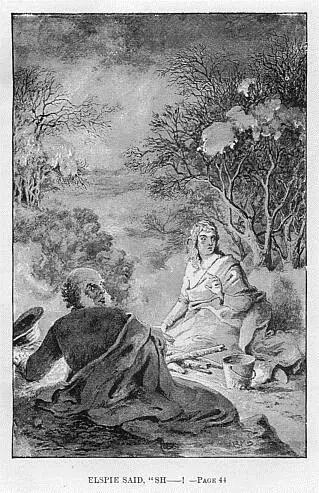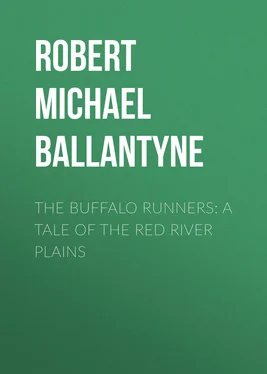Robert Michael Ballantyne - The Buffalo Runners - A Tale of the Red River Plains
Здесь есть возможность читать онлайн «Robert Michael Ballantyne - The Buffalo Runners - A Tale of the Red River Plains» — ознакомительный отрывок электронной книги совершенно бесплатно, а после прочтения отрывка купить полную версию. В некоторых случаях можно слушать аудио, скачать через торрент в формате fb2 и присутствует краткое содержание. Жанр: Детские приключения, literature_19, foreign_antique, foreign_prose, foreign_children, на английском языке. Описание произведения, (предисловие) а так же отзывы посетителей доступны на портале библиотеки ЛибКат.
- Название:The Buffalo Runners: A Tale of the Red River Plains
- Автор:
- Жанр:
- Год:неизвестен
- ISBN:нет данных
- Рейтинг книги:5 / 5. Голосов: 1
-
Избранное:Добавить в избранное
- Отзывы:
-
Ваша оценка:
- 100
- 1
- 2
- 3
- 4
- 5
The Buffalo Runners: A Tale of the Red River Plains: краткое содержание, описание и аннотация
Предлагаем к чтению аннотацию, описание, краткое содержание или предисловие (зависит от того, что написал сам автор книги «The Buffalo Runners: A Tale of the Red River Plains»). Если вы не нашли необходимую информацию о книге — напишите в комментариях, мы постараемся отыскать её.
The Buffalo Runners: A Tale of the Red River Plains — читать онлайн ознакомительный отрывок
Ниже представлен текст книги, разбитый по страницам. Система сохранения места последней прочитанной страницы, позволяет с удобством читать онлайн бесплатно книгу «The Buffalo Runners: A Tale of the Red River Plains», без необходимости каждый раз заново искать на чём Вы остановились. Поставьте закладку, и сможете в любой момент перейти на страницу, на которой закончили чтение.
Интервал:
Закладка:
Having finished the supper which he had purchased at such a terrible price, the young man gathered his things together, packed the provisions on his back, put on his snow-shoes and left the scene of the murder.
Although a dark night, there was sufficient moon-light to enable him to pick his steps, but he had not advanced more than two miles when he came upon the track of a party that had preceded him. This rendered the walking more easy, and as he plodded along he reflected that the wolves would soon find Perrin’s body, and, by tearing it to pieces render recognition of the victim impossible.
Suddenly it occurred to him that if any of the scattered band of hunters should come on the camp before the wolves had time to do their work, the print of his snow-shoes might tell a tale—for snowshoes were of various shapes and sizes, and most of his companions in the Settlement might be pretty well acquainted with the shape of his. The danger of such a contretemps was not great, but, to make quite sure that it should not occur, he turned round and walked straight back on his track to the camp he had just left—thus obliterating, or, rather, confusing the track, so as to render recognition improbable. As he walked over it a third time, in resuming his march to the Settlement, all danger on this ground, he considered, was effectually counteracted. Of course, when he reached the tracks of the party before mentioned, all trace of his own track was necessarily lost among these.
That “murder will out” is supposed to be an unquestionable truism. We nevertheless question it very much; for, while the thousands of cases of murder that have been discovered are obvious, the vast number, it may be, that have never been found out are not obvious, however probable.
The case we are now describing seemed likely to belong to the class which remains a mystery till altogether forgotten. Nevertheless Nemesis was on the wing.
While Duncan McKay junior was thus pushing his way over the plains in the direction of Red River Settlement, two poor half-breed women were toiling slowly over the same plains behind him, bound for the same haven of hoped-for and much-needed rest and refreshment. The poor creatures had been recently made widows. The husband of one, Louis Blanc, had been killed by Indians during this hunt; that of the other, Antoine Pierre, had met his death by being thrown from his horse when running the buffalo. Both women were in better condition than many of the other hunters’ wives, for they had started on the homeward journey with a better supply of meat, which had not yet been exhausted.
It happened that Marie Blanc and Annette Pierre came upon McKay’s camp soon after he left it the second time. Here they prepared to spend the night, but, on discovering marks of fresh blood about, they made a search, and soon came on the unburied corpse of the murdered man, lying behind a bush. They recognised it at once, for Perrin had been well-known, as well as much liked, in the Settlement.
Neither of the women was demonstrative. They did not express much feeling, though they were undoubtedly shocked; but they dug a hole in the snow with their snow-shoes, and buried the body of the hunter therein—having first carefully examined the wound in his breast, and removed the poor man’s coat, which exhibited a burnt hole in front, as well as a hole in the back, for the bullet had gone quite through him.
Then they returned to the camp, and made a careful examination of it; but nothing was found there which could throw light on the subject of who was the murderer. Whether a comrade or an Indian had done the deed there was nothing to show; but that a murder had been committed they could not doubt, for it was physically almost impossible that a man could have shot himself in the chest, either by accident or intention, with one of the long-barrelled trading guns in use among the buffalo-hunters.
Another point, justifying the supposition of foul play, was the significant fact that Perrin’s gun, with his name rudely carved on the stock, still lay in the camp undischarged .
“See—here is something,” said one woman to the other in the Cree tongue, as they were about to quit the camp.
She held up a knife which she had found half buried near the fire.
“It is not a common scalping-knife,” said the other woman. “It is the knife of a settler.”
The weapon in question was one of the large sheath-knives which many of the recently arrived settlers had brought with them from their native land. Most of these differed a little in size and form from each other, but all of them were very different from the ordinary scalping-knives supplied by the fur-traders to the half-breeds and Indians.
“I see no name on it—no mark,” said the woman who found it, after a critical inspection. Her companion examined it with equal care and similar result.
The two women had at first intended to encamp at this spot, but now they determined to push forward to the Settlement as fast as their exhausted condition permitted, carrying the knife, with the coat and gun of the murdered man, along with them.
Chapter Five.
Saved
Duncan McKay senior was dreaming of, and gloating over, the flesh-pots of Red River, and his amiable daughter was rambling over the green carpet of the summer prairies, when the sun arose and shone upon the bushes which surrounded their winter camp—Starvation Camp, as the old man had styled it.
There is no saying how long Duncan would have gloated, and the fair Elspie wandered, if a hair of the buffalo robe on which the former lay had not entered his nostril, and caused him to sneeze.
Old McKay’s sneeze was something to be remembered when once heard. Indeed it was something that could not be forgotten! From the profoundest depths of his person it seemed to burst, and how his nose sustained the strain without splitting has remained one of the mysteries of the Nor’-West unto this day. It acted like an electric shock on Elspie, who sat bolt upright at once with a scared look that was quite in keeping with her tousled hair.

“Oh! daddy, what a fright you gave me!” Elspie said, remonstratively.
“It iss goot seventeen years an’ more that you hev had to get used to it, whatever,” growled the old man. “I suppose we’ve got nothin’ for breakfast?”
He raised himself slowly, and gazed at Elspie with a disconsolate expression.
“Nothing,” returned the girl with a look of profound woe.
It is said that when things are at the worst they are sure to mend. It may be so: the sayings of man are sometimes true. Whether or not the circumstances of Elspie and old McKay were at the worst is an open question; but there can be no doubt that they began to mend just about that time, for the girl had not quite got rid of her disconsolate feelings when the faint but merry tinkle of sleigh-bells was heard in the frosty air.
The startled look of sudden surprise and profound attention is interesting to behold, whether in old or young. It is a condition of being that utterly blots out self for a brief moment in the person affected, and allows the mind and frame for once to have free unconscious play.
Elspie said, “Sh!—” and gazed aside with wide and lustrous eyes, head a little on one side, a hand and forefinger slightly raised, as if to enforce silence, and her graceful figure bent forward—a petrifaction of intensely attentive loveliness.
Old McKay said “Ho!” and, with both hands resting on the ground to prop him up, eyes and mouth wide open, and breath restrained, presented the very personification of petrified stupidity.
Читать дальшеИнтервал:
Закладка:
Похожие книги на «The Buffalo Runners: A Tale of the Red River Plains»
Представляем Вашему вниманию похожие книги на «The Buffalo Runners: A Tale of the Red River Plains» списком для выбора. Мы отобрали схожую по названию и смыслу литературу в надежде предоставить читателям больше вариантов отыскать новые, интересные, ещё непрочитанные произведения.
Обсуждение, отзывы о книге «The Buffalo Runners: A Tale of the Red River Plains» и просто собственные мнения читателей. Оставьте ваши комментарии, напишите, что Вы думаете о произведении, его смысле или главных героях. Укажите что конкретно понравилось, а что нет, и почему Вы так считаете.












